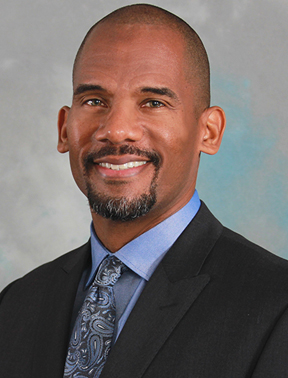This story was originally published on the "Our Stories" section within the Trinity Health website – read it here.
Abdul Harris, MD – General Surgery – Saint Agnes Care Surgical Services

For teenage Abdul Harris, working in a hospital as a general surgeon was far from his list of future career choices.
For a majority of his childhood, Harris grew up in a single-parent home in the neighborhoods of South Central Los Angeles and Compton in Southern California.
Back then, Martin Luther King Jr./Drew Medical Center in his neighborhood was more infamously known as "Killer King" – the place where people went to die or get patched up after a gang-related incident.
It wasn't until college, after attending a summer program at Tulane University in New Orleans, Louisiana, that Harris began seriously considering practicing medicine.
Now, at 51, Harris has joined Saint Agnes Care Surgical Services – the most recent appointment in his impressive twenty-year career.
"I had no idea I would go into medicine, let alone be a surgeon," Dr. Harris recalls of his childhood. "We didn't really have access to health care, and I never spent much time in a hospital until medical school."
Harris and his younger brother were raised primarily by their father after their parents divorced when the boys were still young. Harris describes his father as strict and driven. He made sure the boys focused on their studies and athletics and stayed off the streets.
"Despite our situation, my dad always told us we would go to college and make something of ourselves," Dr. Harris said. "He held many jobs throughout the years, but he was always in school trying to learn something new."
Fittingly, when Harris graduated from medical school at UC Davis in June of 1995, his father completed a PhD in clinical psychology in December of the same year.
"At first, I thought I wanted to practice family medicine and be a primary care physician, but then during my clinical rotations at UC Davis, I fell in love with surgery," Dr. Harris says.
After completing his six-year surgery residency in the Sacramento area, Harris reconnected with a colleague from UC Davis Medical Center who was looking for a partner to join him in Santa Rosa, California at Santa Rosa Memorial Hospital.
He spent almost 18 years in Santa Rosa, becoming a prominent member of the hospital’s trauma team. During this time, Harris served as chairman of the surgery department twice and worked his way up to the hospital’s chief of staff at age 41.
However, Harris' overwhelming professional successes were not earned without struggle. Upon entering medical school in 1991, he was one of only six African American students accepted into the medical school class at UC Davis. He faced a similar demographic skew in Santa Rosa – an area with a historically small African American population.
Harris knew it would take some serious work to prove himself, but he did not let adversity slow him down. He dove into his studies and strove to distinguish himself from his fellow students.
He also became an active voice among his peers, speaking out for better representation for medical students from underrepresented communities.
"I always worked hard to prove people wrong," Dr. Harris says. "I wasn't supposed to even go to college. Statistically, I should have been in prison or a cemetery. Thankfully my father's teachings were instilled from a young enough age to keep me from making bad choices."
During his youth, Harris was taught to expect to be treated differently than others and to act a certain way with law enforcement and authority figures to avoid trouble.
"As a teen, I witnessed some things that left an indelible mark on me," Dr. Harris says. "What's going on in our country today isn't new. I grew up with it in the community I came from."
After moving to Fresno in 2018, Harris was in for another major culture change. Unlike the vineyards and rolling hills of Sonoma County, he discovered a city diverse in its underlying poverty and health issues.
"The population in Fresno is pretty unhealthy, but poverty seems to be a huge issue for underrepresented groups," Dr. Harris says.
"As a result, a lot of the patients I treat here have more advanced forms of disease or complications than I faced in Santa Rosa. Another hard part about the Valley is that if a patient needs further care than we're able to provide here, it can be a real challenge to get them transferred to get the care they need."
The challenges many Valley residents face with getting access to health care aren't so unlike those Harris and his community faced in Los Angeles. Harris and his blended family of seven are still settling in to life in Fresno, but he's taking careful notes of his new town.
One thing remains the same across all of the cities Harris has lived in – the need for positive role models in the lives of youth and children. In Santa Rosa, Harris often visited classrooms to give lectures or speak with health science students about career options.
"For some of those students, seeing me might have been their first exposure to someone who looked like them in a profession they wanted to pursue," Dr. Harris says.
"I wanted to leave them with the impression that if I could make it, they could too. I didn't have a mentor like that growing up, and I think young people could benefit from more exposure to good role models."
Harris knows the hard life many of the students he speaks to are in for. He makes sure they walk away with some of his father's most important teachings.
"My dad always believed in delayed gratification," Dr. Harris says. "He taught us to put in work to get what we wanted and that we wouldn't get anything for free. He instilled a strong work ethic in me that I hope to pass on."
